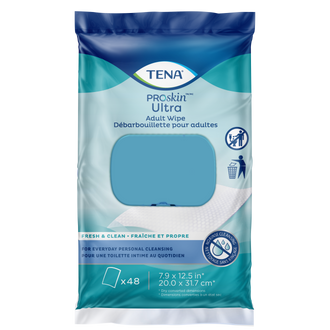It's been through the ringer a bit with some hair shedding that I'm experiencing… the hair scarf just came to my rescue. - Skylar Liberty Rose
Sep 30, 2024
Menopause often brings hot flashes and mood swings to mind, but there’s a bit more to it than meets the eye.
We discussed these often-overlooked side effects of menopause in our Can’t Keep It In podcast’s Aging episode, hosted by Angel Laketa Moore, with special guest Skylar Liberty Rose, a writer and pro-aging advocate.
Whether you’re experiencing this transition yourself or supporting someone who is, understanding these lesser-known symptoms can make a substantial difference in how you understand and manage menopause.
Symptoms of Menopause
Menopause usually happens when you have gone 12 consecutive months without a period, marking the end of your periods and fertility as your ovaries slow down reproductive hormone production.1
From breast tenderness to hair loss or thinning and urinary urgency1, these lesser-known symptoms can really affect how you feel. Let’s take a closer look at these hidden aspects to get the full picture of what menopause is all about.
Hair Loss and Thinning
Menopause can bring about some unexpected changes, and one of them might be hair growing where it didn’t before or you may find your hair thinning out.2 And as your hormone levels fluctuate, you might also notice that your once-thick hair starts to thin out or that you’re shedding more strands than usual.2
To figure out if your hair loss is related to menopause, look for general thinning across your scalp rather than specific bald spots like on the top of your head or on the sides, which might indicate different issues like alopecia.2
Here’s how you can manage this lesser-known symptom:
- Diet Adjustments: Eating a balanced diet full of nutritious foods can help.2 Taking vitamins and supplements for a vitamin deficiency may also help with supporting hair health.2
- Hair Care Tips: Be gentle with your hair. Consider changing your hairstyling routine to minimize damage to your hair follicles.2
- Hair Scarf: Skyla embraces practical tools, like hair scarves, to feel comfortable and confident despite changes in hair volume.
Dizziness and Headaches
Dizziness is a common symptom during menopause, and can be causes from hormonal shifts, changes in blood sugar, or anxiety.3 This unsettling symptom might make you worry about falling or losing your balance.
Menopause may also bring about hormonal shifts that might lead to headaches or migraines.3 These headaches can be different from what you might have experienced at other times in your life, and researchers think that this is triggered by fluctuating hormone levels and the stress that can come with common mid-life changes.3
To manage these symptoms:
- Stay Hydrated: Drink plenty of water to avoid dehydration.3
- Get Up Slowly: Stand up gradually from sitting or lying positions to prevent light-headedness. 3
- Eat Frequently: Try to have smaller meals and snacks throughout the day to keep your blood sugar levels stable. 3
But, if dizziness is frequent or if you are experiencing symptoms like a fever, extreme headaches, or tingling sensations, you should speak to your healthcare provider for further advice and assessment.3
Tiredness, Fatigue and Sleep Disturbance
Menopause can bring about extreme tiredness and fatigue, which often stems from disrupted sleep due to hot flashes, urinary urgency during the night1, hormonal changes, and emotional stress.4
The challenge is that poor sleep quality can make fatigue worse, creating a cycle that affects your ability to tackle daily tasks and can lead to irritability and trouble concentrating.4
To break this cycle and improve your sleep and energy levels, try these strategies:
- Create a Comfortable Environment: Make your bedroom a sleep-friendly space—think cool4, dark, and quiet.
- Avoid Stimulants: Steer clear of caffeine and heavy meals before bed, which are triggers to hot flashes, and may help improve sleep quality.4
- Practice Relaxation: Techniques like deep breathing, meditation, or gentle yoga can reduce stress and improve sleep.1
Urinary Incontinence
Did you know that up to 30% of American women aged 50–64 deal with urinary incontinence, while only about 5% of men in the same age group experience it?4 It’s a significant difference and highlights how common this issue can be for women during menopause.4
There are a few several types of urinary incontinence that are linked with menopause.5 This means that you could experience stress incontinence (leaking urine when you cough, sneeze, or exercise) or urge incontinence (a sudden, intense urge to urinate with little warning).5
Managing urinary incontinence involves a few practical steps:
“Urinary incontinence still something that you can take steps on. You can do your exercises, watch your diet, and watch what you're doing in terms of movement.” – Skyla
- Pelvic Floor Exercises: Strengthening your pelvic floor muscles with Kegels can help improve bladder control.4
- Bladder Training:Try scheduled bathroom visits and gradually extend the time between them to train your bladder and reduce urgency.4
- Use Protective Products: TENA products offer reliable protection and comfort for managing urinary incontinence, helping you stay confident throughout the day.
Not sure where to start? The products below are crafted to help you feel confident and comfortable throughout the day, even when managing menopause-related urinary incontinence.
- TENA Sensitive Care Very Light Liners: These liners are ultra-thin yet highly absorbent, making them perfect for light leaks. They offer discretion and comfort without compromising on protection.
- TENA Sensitive Care Ultra Thin Pads: These discreet pads are enriched with the SkinComfort Formula, featuring a skin-friendly layer and 100% breathable materials, these pads offer triple protection against bladder leaks, odor, and wetness, ensuring comfort and security for light bladder leakage, drips, and dribbles.
- TENA Sensitive Care Extra Coverage Overnight Pads: These pads offer superior protection and comfort, so you can have a worry-free night when you need some extra protection while you’re asleep.
Hot Flashes
Hot flashes are one of the most talked-about symptoms of menopause, but there’s more to them than just feeling overheated.4 They occur due to hormonal changes, particularly the decline in estrogen, which affects the body’s temperature regulation and can last three to five years.4
Hot flashes can vary widely in frequency and severity, with some women experiencing a more intense hot flash than others.4 The sudden warmth can disrupt daily life, affecting your comfort, sleep, and overall feeling of well-being.4
Here’s how you can manage hot flashes:
- Layer Your Clothing: Wear breathable, layered clothing that you can easily remove if you start feeling warm.4
- Use Fans: Keep a fan handy or use air conditioning to help cool down quickly.
- Avoid Triggers: Identify and avoid common triggers like spicy foods, hot beverages, and alcohol that can worsen hot flashes.4
Implementing these strategies can help ease the discomfort of hot flashes and make them more manageable.
Acne
Acne isn’t just a teenage problem—it can also crop up during menopause due to hormonal fluctuations. As estrogen levels drop and androgens (male hormones) become more prominent, you might find yourself dealing with breakouts, even if you haven’t had acne since adolescence.6
Menopausal acne can differ from teenage acne in that it might be more cystic and located on different areas of your face. To tackle this issue:
- Use Non-Comedogenic Products: Choose skincare products that won’t clog your pores.6
- Maintain a Regular Cleansing Routine: Wash your face twice daily to keep your skin clear. 6
- Seek Dermatologist Advice: If acne persists or becomes severe, a dermatologist can provide personalized treatment options.6
Libido changes
Changes in libido during menopause are completely normal but can be challenging. Hormonal fluctuations, vaginal dryness, and urinary incontinence, which may cause embarrassment, can all affect your sex drive.4
To maintain intimacy and address changes in libido:
- Communicate Openly: Talk with your partner about your feelings and any changes in desire can have a positive impact and strengthen your relationship.4
- Explore New Intimacy Options: Find ways to connect with your partner that don’t solely focus on sex, such as spending quality time together or exploring new forms of affection.
- Seek Professional Help: If changes in libido are impacting your relationship, consider talking to a healthcare provider or a trained sex therapist.4 They can offer support and guidance tailored to your needs.
If you’re feeling that menopause is affecting your sex life or sex drive, here’s a great article about menopause and libido if you would like to find out more.
References
1. Cleveland Clinic. ‘Menopause’. 24 June 2024. Accessed 13 August 2024. Available from: https://my.clevelandclinic.org/health/diseases/21841-menopause
2. Cleveland Clinic. ‘Hair Loss in Women’. 2 October 2021. Accessed 13 August 2024. Available from: https://my.clevelandclinic.org/health/diseases/16921-hair-loss-in-women
3. Healthline. ‘Is Dizziness a Symptom of Menopause?’. 31 July 2023. Accessed 13 August 2024. Available from: https://www.healthline.com/health/menopause/menopause-dizziness
4. Harvard Health. ‘Dealing with the symptoms of menopause’. 21 March 2017. Accessed 15 August 2024. Available from: https://www.health.harvard.edu/womens-health/dealing-with-the-symptoms-of-menopause
5. Healthline. ‘Menopause and Urinary Incontinence’. 1 April 2019. Accessed 15 August 2024. Available from: https://www.healthline.com/health/menopause/urinary-incontinence
6. Healthline. ‘Hormonal Acne: Traditional Treatments, Natural Remedies and More’. 13 February 2023. Accessed 15 August 2024. Available from: https://www.healthline.com/health/beauty-skin-care/hormonal-acne







